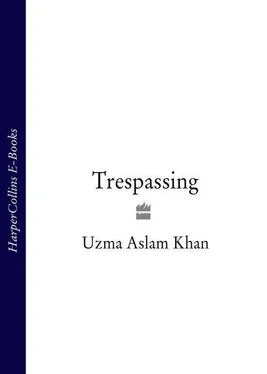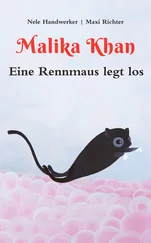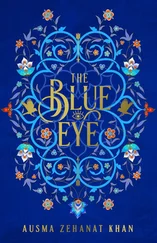Handsome frowned, ‘That’s twice this month.’ He pushed his plate away and marched outside, Chikna in tow.
Three of them waited, equipped with batons and a list of grievances — nonpayment of taxes, unregistered documents, expired licenses, a distaste of bus ornaments. Ornamentation, they argued, was a traffic hazard. How could the driver see when the bus was a distraction?
‘But it’s a distraction from the outside,’ Salaamat, still in the room, heard Handsome explain.
The Senior Authority raised his baton menacingly. ‘How can he see out the rear-view mirror when he has that,’ he smashed a crown off the fender of a bus, ‘staring at him?’
Salaamat stepped outside. The Authority had attacked Rani’s bus. A part of him was relieved: the more damage the bus suffered, the longer she’d stay. But another part was outraged. How dare this man threaten her?
As the Senior Authority advanced toward the rear, Rani covered herself entirely. He tapped the cloth away with his stick and leered. Before he could catch himself, Salaamat blurted, ‘The crown would not have been staring at him through the rear-view mirror.’
‘Oh is that right?’ The man spun around. ‘Would you like to show me what he would have been looking at?’ The two other Authorities, absorbed in smashing more fenders, joined their boss.
The boss swung his baton. Before Salaamat could pull away, it cut across his arm. He buckled. A second man struck his knee. A third, his stomach. ‘Who are you to answer us?’ they hissed. ‘You’re just an ajnabi.’
Salaamat’s head began to whirl. He saw three pairs of glistening boots. One pair aimed for his groin. ‘We’ll show you your place.’
None of the other workers moved. None, not even Chikna, had spoken. They’d given him what he’d asked: food and lodging. The rest was up to him. Ghee burned his nose as he began to vomit.
Nearly three years ago, the first kick had also struck his knee. Then too he’d vomited. He heard the wind in his hair from that night, hair since trimmed. But though short now, his locks were still reins to steer him with. The Authorities yanked them as they punched.
There had been the sound of waves. His grandmother’s watchfulness. Soft, soft sand. And then the turtle’s shell. He reached out. Rani was beside him, mopping his forehead with cool fingers, invisible to all but him.
Just before losing consciousness he saw Handsome peel several hundred rupees from a thick wad of notes in his pocket.
Three days later, after tossing in delirium on the hard floor of his littered room, he stumbled outside to find Rani gone.
MAY 1985
He had Fridays off. He spent them roaming the city, on foot and by bus. He made sure to travel on a different one each time, and in his head kept meticulous track of their various designs. Before his first year at Handsome’s was up, he’d sat in over a hundred inner-city buses. But he never saw Rani again.
It was on a sweltering day in May, on a bus with a two-foot PIA plane model on its roof and a driver who skated down a runway only he appeared to see, that Salaamat met his youngest brother, Shan.
‘You’re here!’ he said, surprised at his own happiness. The boy had been twelve when they’d last met. Now his voice was beginning to crack and on his upper lip hovered a wisp of fuzz. ‘You look well.’
Shan barely knew him. ‘Yes,’ he shrugged.
‘Are you alone?’ Salaamat pressed on.
The bus screeched and swerved. Salaamat’s head bumped the canopy of a green waterfall.
‘No. Aba has come. So have Sumbul and Hamid, Chachoo and his family.’
‘Where are they?’
‘In Thatta. But we’re about to move here, in the city. Aba’s been hired at a rich man’s house. His name is Mr Mansoor. He’s very important.’ Shan straightened his shoulders proudly.
The bus stopped, then started again. Shan hadn’t mentioned their mother.
Salaamat looked at his brother, lean and dark like himself. Like her. He saw her fingers, pink and crinkled like the shrimp she peeled, rejected by a husband who lived off them. He whispered, ‘And Ama?’
‘She died.’
In the jammed bus still more commuters were piling in. They shook like a tin of nails. When Salaamat spoke his teeth rattled. He cursed the driver for mimicking a pilot. Then he cursed Shan. ‘Bastard! When? Why wasn’t I told?’
Shan stepped back. ‘A few months after you left,’ he cried. ‘Dadi said there was no point calling you. She said you had to keep working.’
‘That wench! Just because she saved my life once, doesn’t mean she owns it.’
Shan moved further away.
Salaamat’s ear began to ache. He’d only distanced his brother even more. But what did it matter? From the day his grandmother told him to leave, his family had forgotten him. Except perhaps his mother, and his sister Sumbul. They’d cried when he left. Yes, they’d have thought of him. He took a deep breath. Except for his pounding ear, everything went deathly still.
After a long pause, he asked more gently, ‘Is Sumbul well?’
‘Yes.’ And then: ‘She often speaks of you.’
Salaamat could not resist a smile. ‘What were you doing in Thatta?’
‘We were guarding the tombs of Makli Hill.’ He lunged into an elderly man, then straightened up again. ‘Chachoo and his family are still there, but we’re going to the rich man’s house. This is my stop.’
Salaamat hopped out with him. He loosened his shoulders. They were always sore now since his thrashing by the Authorities. But the men never had the chance to beat him again. He’d learned to quickly duck into his den whenever they came.
Shan caught another bus, and a third, and finally, in the late afternoon, they reached a neighborhood unlike any other Salaamat had frequented on previous Fridays. Streets were wide and tree-lined. Shops had tinted glass and words scrawled in beautiful, swirling script. Houses were like forts, with massive gates and towering walls topped in barbed wire partially concealed behind ropes of ivy. The air was cleaner. But one thing remained the same: boys played cricket in the street.
It was into a street with a game in progress that Shan now turned. The bowler had the definite advantage, for the lane was at a sharp incline and he stood at the top, while the batsman hunkered below, braving the speed of the descending toss. ‘Out!’ came a voice from the top of the hill. A girl’s voice. The wicket, three frail wooden pins, soared into the air.
‘That was just the wind!’ complained the batsman. ‘Anything would send this stupid wicket flying.’
Salaamat squinted, but the bowler was in shadow. The umpire, a man nearly as wide as Handsome but not as tall, raised a finger and declared, ‘Out!’ From up the hill the invisible bowler hooted.
‘That’s favoritism!’ screamed the batsman. The umpire rolled on the balls of his feet and grinned at the bowler skipping into the sunlight, down toward him.
The bowler was a girl. Well, more than just a girl. Her yellow kameez was both thin enough and tight enough to reveal two small but shapely breasts, and an equally shapely behind. The umpire embraced her, ‘Shabash, beti!’
Her smooth, nut-brown cheeks were flushed and sweaty, her shoulder-length hair a delicious mess. ‘Aba,’ she laughed, ‘that’s three for ten runs at the end of just three overs.’
The lone fielder picked his nose. ‘This is so damn boring,’ he announced.
‘Yes,’ said the batsman. ‘Boring and only for cheats.’ He threw down his bat and stormed inside a gate with wrought-iron waves rising from the top. The fielder dug into his other nostril.
Читать дальше
Конец ознакомительного отрывка
Купить книгу












